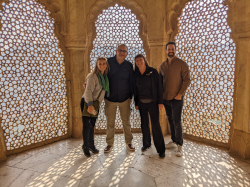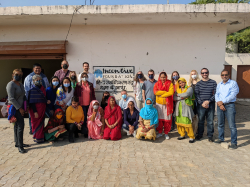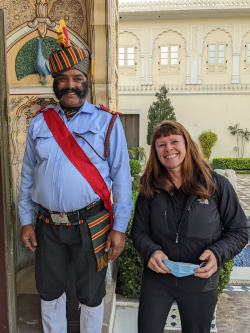India CIBER Trip Expands Professors’ Perspectives
PROVO, Utah – Aug 17, 2022 – As 2021 drew to a close, faculty members from colleges across the country boarded a plane and traveled to India, a country known not only for its history, vibrant culture, and beautiful architecture, but also for its role in global business. The trip, which was cosponsored by the Whitmore Global Business Center at the BYU Marriott School of Business, was designed to provide trip attendees with useful insights about international business.
This trip to India was sponsored by BYU Marriott and Florida International University (FIU). Both schools are designated by the U.S. federal government as one of 17 nationwide Centers for International Business Education and Research (CIBERs) and receive grants to help fund international business experiences and research. The India CIBER trip has taken place for years; however, the past few trips were held virtually because of concerns about the COVID-19 pandemic. In December 2021, when the trip took place, the COVID-19 numbers in India were low enough that participants were cleared to travel.
Professors from Salt Lake Community College (SLCC), Broward College, FIU, Northwestern Connecticut Community College, Francisco Marroquin University, North Dakota State University, and Temple University all came together for the adventure to India. They were joined by entrepreneurs from the surrounding areas of the participating institutions, bringing the total count of participants to 15 people.
However, when the trip attendees reached India, COVID-19 numbers started rising again, due to the spread of the Omicron variant. “Honestly, I was so impressed with the way our trip leaders handled the hurdles COVID-19 threw at us—they made sure we were safe,” says Lucy Smith, one of the trip members and director of the Engaged Learning Office at SLCC.
Although many of the planned activities for the trip were canceled because of the Omicron variant, participants still heard from a panel of academics. Members of the Confederation of Indian Industries (CII), an educational think tank, discussed the economy in India and sparked a conversation about education theory.
“The CII members who spoke with us were professors working with industry,” says Jonathon Wood, managing director of the GBC. “They talked to us about what India needs to move forward. The panel contributed to our ultimate goal of this trip: to help participants understand more about international business and education.”
In addition to hearing from members of the CII, attendees also visited the largest tile manufacturer in India, Kajaria Ceramics Limited, and observed how the business operated. The workers at Kajaria guided the faculty members and entrepreneurs around the manufacturing plant and discussed their marketing strategy.
Visiting these businesses gave the attending faculty members ideas about how to conduct their own study abroad programs. Tyson Riskas, who helps run the India study abroad program offered at SLCC, says the trip helped him identify ways to better engage students in their study abroad experiences.
“One issue we’ve struggled with in our past India study abroad trips is ensuring that our visits were business oriented enough and that our students could work on assignments and have opportunities for reflection,” says Riskas.
“During this trip, many of the professors worked on developing case studies based on the businesses we toured,” he continues. “After watching these professors, I thought, ‘Okay, I could create some case studies before our study abroad trips so students can be familiar with the businesses, or I could ask the students to create their own case studies after the visits. I understood how business visits could help our study abroad students moving forward.”
Although trip attendees missed some of the planned business aspects of the trip, they compensated for these losses by sightseeing instead. One of their favorite places was Mother Teresa’s house. “The feeling at her house was so powerful that I teared up,” Smith remembers. “I experienced the same emotions again when we visited a Sikh temple—I felt an immediate connection to both places.
“Mother Teresa’s work resonates with what I do in SLCC’s community engaged learning program and reflects the values I hope to further instill in my students,” she continues. Smith also finished the trip with ideas about how to apply her newly gained insights in the classroom. She teaches a course that examines the use and distribution of illicit drugs around the world from a social and environmental perspective. She plans to apply what she learned about India’s economy, rising middle class, and need for more career technical education by discussing with her students how these positive factors can reduce drug production and consumption.
“I appreciated this amazing opportunity to visit India. Since I help run our study abroad programs and teach an international general education class, traveling and experiencing other countries first hand is amazing,” Smith adds. “The opportunity to learn from people in other countries and bring that knowledge back with me is so valuable.”



Media Contact: Chad Little (801) 422-1512
Writer: Sarah Calvert



